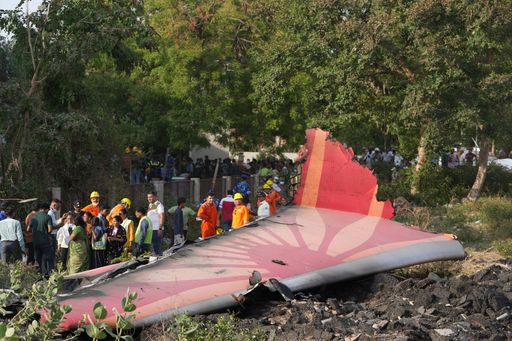On the fateful morning of July 28, 2010, Junaid Hamid’s world turned upside down when Airblue Flight 202 carrying his wife crashed into the Margalla Hills near the Pakistani capital of Islamabad, killing all 152 people on board.
His immediate instinct was to shield his three young children — aged two-and-a-half, six, and eight — from the overwhelming grief that engulfed their family.
He frisked them away to a friend’s house within minutes because he didn’t want to expose them to the scores of grieving people gathering at his home.
“My first reaction was to protect my children,” Hamid tells TRT World.
In the wake of a devastating commercial plane crash in Ahmedabad in the western part of India on Thursday that claimed at least 265 lives, Hamid extends a hand of empathy to the grieving families across the border.
Having endured the profound grief of losing his wife in a plane crash, Hamid understands the trauma now gripping the families affected by the air accident on the other side of the border. Arch-rivals for eight decades, neighbouring Pakistan and India clashed last month in the biggest air battle since World War II in terms of the number of aircraft involved.
“My deepest condolences to all the affected families,” he says. “An air crash is such a thing (that) you don’t get closure. You don’t get a chance to say goodbye for the rest of your life.”
Hamid turned his personal tragedy into an international movement for justice, legislative reform, and compassion for air crash victims.
Over the last decade and a half, he has channelled his trauma into helping those navigating the unimaginable shock of losing one’s loved ones in plane crashes. Perhaps more important is his ongoing fight for accountability from airlines and governments following air accidents.

Turning tragedy into a life-long mission
Hamid credits his father’s words for anchoring him in the years since the tragedy tore apart his family: “Son, we have to be thankful for what Allah has left behind and be patient for what He has taken.”
These words, along with emotional support from friends, neighbours, and colleagues, helped him navigate the initial shock. His wife’s body was found intact at an Islamabad hospital, a rare mercy in a crash where 58 families could not even identify their loved ones, leaving them to mourn at a mass grave.
“Alhamdulillah [Thank God], we had closure,” Hamid says.
Rather than succumbing to despair, Hamid transformed his grief into a force for change.
“My coping mechanism was to convert this grief into something productive,” he says. Within days of the crash, he began researching international aviation laws and came across a compensation framework in place at the time in Pakistan, which valued a victim’s life at just 38,000 rupees—around $450 in 2010.
Motivated by this discovery, he started reaching out to other affected families, compiling their details in an Excel sheet. He later founded an association to amplify their collective voice and push for fairer treatment.
His campaign highlighted the shortcomings in the crash investigation, which eventually held the pilot and the air traffic control staff responsible.
Despite warnings to back down, Hamid persisted in his search for answers. “They turned our world upside down,” he says. “We are common people — 9-to-5 workers who pay taxes and comply with rules. It’s my right to stand up.”
His media appearances on prime-time talk shows drew attention to the gap between international aviation standards and local practices, particularly regarding the 1999 Montreal Convention, which outlines airline liability in cases of passenger death or injury. Although Pakistan had ratified the treaty, it had not yet been fully implemented at the time.
Two years after the crash, he successfully pushed for the passage of the Carriage-by-Air Act, setting a minimum compensation of five million rupees for air crash victims. Though still modest, this was a monumental leap from the previous figure of 38,000 rupees.
His efforts continued, and by 2022, following another plane crash in Karachi, the compensation level was raised to 10 million rupees.
Onto the global stage
Hamid’s vision for the protection of the families of plane accident victims extended beyond Pakistan. In 2014, he co-founded the Air Crash Victims Families Federation International (ACVFFI) alongside associations from Spain and Germany.
His work with ACVFFI connects air crash victims’ families worldwide, offering resources, support, and a platform to demand accountability.
Registered in Spain, ACVFFI gained observer status with the International Civil Aviation Organization (ICAO), helping Hamid to advocate for family assistance and rights at the global level.
“I wanted to become a beacon of hope,” he says, reflecting on his journey from a grieving widower to an international advocate for aviation safety and accountability.
Hamid’s advocacy also focuses on the murky world of air crash investigations, where he sees powerful interests at play. “The airline protects itself, the insurance company protects itself, the civil aviation authority protects itself,” he says.
He is particularly critical of how black box data — crucial for determining crash causes — is handled after each crash.
“Insurance companies never let it come to light,” he says, noting that findings of human error could increase airline liability, leading to suppressed or delayed reports.
His insistence on thorough investigations stems from the 2010 Airblue crash, where families were left with more questions than answers. Hamid says transparency is essential for closure, a sentiment he extends to the Ahmedabad crash.
“Even in European and American countries, (crash) investigation is very questionable,” he says, urging for reforms to prioritise victims’ families over corporate interests.

Lack of ethical journalism
Hamid’s experiences with the media in 2010 left him disillusioned. “Media plays like a hound,” he laments, recalling how journalists spread unsubstantiated news that compounded families’ pain in the immediate aftermath of the 2010 crash.
“For the families, the news falls like a mountain,” he says, adding that media sensationalism deepens trauma.
As India reels from its tragedy, Hamid offers more than just condolences. His coping mechanism, rooted in protecting his children, embracing faith, and channelling grief into advocacy, not only healed his family but also transformed aviation policies in Pakistan and beyond.
Through ACVFFI, Hamid says he is committed to supporting Ahmedabad’s victims.
“Whatever Allah [God] did was better,” he says, reflecting on the twist of fate that kept his youngest child, aged two and a half at the time, from boarding the doomed 2010 flight.















